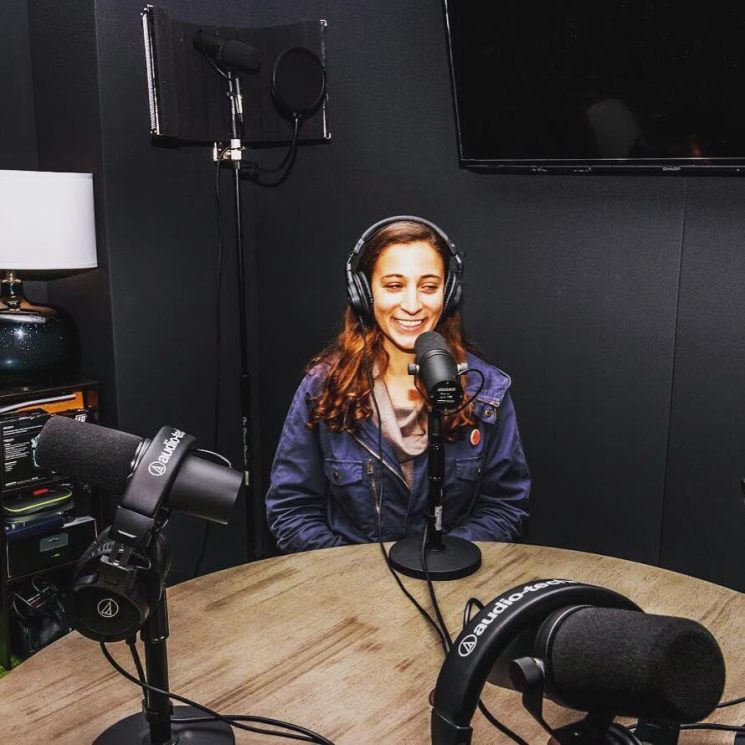Arielle Nissenblatt was first exposed to the idea of community around her family’s dinner table on Friday nights… but she didn’t know at the time just how formative those moments would be.
Growing up in a Jewish household, Arielle remembers those weekly Shabbat dinners — which included neighbors, in addition to her immediate family — fondly.
“We just had the best rollicking Friday night dinners filled with laughter and good food,” Arielle says on an episode of Between Two Mics. “And that was really my first exposure to people coming together into a support network, a place where friendships are created. I just have really warm memories of that experience with community. Ever since, I’ve been building community — and I did not know that was a job!”
Though she couldn’t have seen it at the time, Arielle’s experiences around the Shabbat table would, in fact, inspire her professional path and lead her to an actual career in building communities. (Yes, it’s a job!)
Today, Arielle works as the community manager right here at SquadCast.
Since joining the SquadCast team in August of 2020, Arielle has been instrumental in innovating pretty much everything we do — the content we share in our newsletters, the way we interact with our users… even the format of Between 2 Mics! You can also credit Arielle with the phrase “SquadCasters.” While there was already a community of podcasters coming together around the SquadCast platform when Arielle came on board, she understood the importance of unifying that community and offering them even more value. And that started with coming up with a community name — SquadCasters.
Arielle is passionate about the power of community and the importance of building it in a meaningful, people-driven way. Keep scrolling for more of her thoughts on community and how it functions (and will continue to evolve) at SquadCast.
1. Building community is not the same as networking
Arielle’s professional experience prior to SquadCast formed the basis of her philosophies about community.
When she started the EarBuds Podcast Collective newsletter, for example, she realized just how inclined podcasters, in particular, are to come together. This idea was only further reinforced when she went on to manage the podcast studio of a coworking space. In both roles, Arielle was able to sit back and observe just how much podcasters were craving connection, collaboration and, well, community.
Arielle believes that podcasters are inclined to build community to share information, connect around their passions and to promote their work. But it’s important to remember that — in the podcasting world and beyond — community-building is not the same as networking.
“It’s been instilled in me for so long, the idea that coming together — building community — is different than building a network, because the network is transactional,” she says. “Building a community is really building lasting ties between people.”
2. Rule number-one: give the people what they want
While Arielle broughts lots of experience and ideas to her role as SquadCast community manager, her focus has always been on what SquadCasters are actually looking for in the community.
“The most important aspect of creating communities — and then communities within communities — is: what do the people want?” she says.
When in doubt, she’s not afraid to ask.
Arielle seeks feedback from SquadCast users whenever possible, which has inspired many current and future initiatives that will benefit not only SquadCasters, but the broader podcasting industry as well. Many of the resources and events offered to the SquadCast community — within the SquadCast Facebook groups, for example — were inspired by the needs of real podcasters like you.
3. Don’t build community where it’s not wanted
Part of giving your community what they want is knowing when to give them… nothing.
“We don’t necessarily want to create community or reasons for people to congregate if they’re not going to come and congregate,” Arielle says. “We want to really ask people what they want out of SquadCast. You’re already spending so much time on the internet. Do you want to spend more time on the internet and on Facebook groups? Or in Zooms? Probably not.”
In an age when so much of our time is spent interacting with people remotely, it’s important to consider just how much more remote interaction and virtual community people are actually looking for. Resist the urge to commit resources to community-building efforts that the people you’re trying to connect with don’t actually have the bandwidth for. You’ll waste your time and run the risk of pushing people out of the community by coming on too strong.
Instead, focus your efforts on a smaller number of activities and virtual groups that people will engage with on a regular basis.
4. Experimentation is key to building and improving communities
Arielle isn’t afraid to try different things in growing the SquadCast community. Even the format of the episode of Between 2 Mics on which she appeared was a bit of an experiment! Moving forward, the show will operate using a three-act structure. Evolution is key to building community, since it gives people the chance to react to the changes so you can give them what they want.
“There are always going to be changes to the community,” Arielle says. “We’re constantly experimenting and we always want to hear from our community as to what they want out of a community.”
For more of Arielle’s thoughts on building communities — and previews of what’s to come for the SquadCast community — listen to this episode of Between Two Mics. Be sure to subscribe to get future episodes directly in your preferred podcast player.
Zachariah Moreno is the co-founder, CEO, & CTO of SquadCast. He is also a podcaster, author, developer, and designer. He and his team are on a mission to amplify collaboration.
